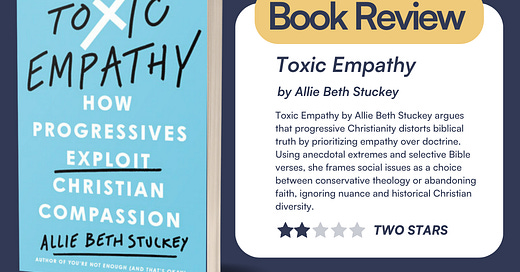A Flawed Polemic Masquerading as Theology
Allie Beth Stuckey’s Toxic Empathy: How Progressives Exploit Christian Compassion claims to expose how progressive Christianity distorts biblical truth. While I don’t personally identify as a progressive Christian, I also reject the rigid either/or thinking that dominates this book. As someone from a Wesleyan-Methodist theological background, I believe Christian faith is both deeply rooted in Scripture and responsive to the complexities of human experience. Unfortunately, Toxic Empathy doesn’t offer meaningful engagement with these tensions. Instead, it reduces complex theological and social issues to culture-war slogans, presenting conservative Reformed theology as the only faithful option while dismissing centuries of Christian diversity.
Stuckey's central thesis—that "toxic empathy" dupes Christians into abandoning Scripture for secular agendas—is undermined by reductive arguments, selective engagement with theology, and a blatant conflation of partisan politics with biblical fidelity.
Structure and Methodology: A House Built on Strawmen
Stuckey organizes the book around five progressive "lies" she deems harmful to Christianity:
"Abortion Is Health Care"
"Trans Women Are Women"
"Love Is Love"
"No Human Is Illegal"
"Social Justice Is Justice"
Each chapter follows a predictable formula:
Anecdotal extremes: Stuckey opens with emotionally charged stories (e.g., a mother forced to carry a terminally ill child, a detransitioner's regret) presented as representative of progressive positions.
Proof-texting: Scripture is wielded like a cudgel, with verses plucked out of context to "refute" progressive claims (e.g., citing Leviticus 19:15 on impartial justice while ignoring its direct call to love immigrants as oneself).
False binaries: Complex issues are reduced to "biblical truth vs. woke ideology," dismissing nuanced theological traditions (e.g., Wesleyan social holiness, Catholic subsidiarity) that bridge faith and justice.
Ironically, this approach mirrors the "toxic empathy" Stuckey condemns: it manipulates readers' emotions (fear of cultural decay, distrust of institutions) while offering little substantive engagement with opposing viewpoints.
Critical Chapter Breakdown: Where the Book Falls Short
1. Abortion: Dismissing the Holistically Pro-Life Movement
Stuckey frames abortion as a simple moral binary: either you oppose all abortions, or you endorse "child murder." She dismisses the holistically pro-life movement—which opposes abortion while also advocating for prenatal care, parental support, and systemic reforms—as a progressive distraction.
For example, she derides Lecrae's emphasis on addressing root causes of abortion (poverty, lack of healthcare) as "toxic empathy," ignoring how early Christian communities materially supported vulnerable mothers (Acts 4:32-35).
What's missing: Acknowledgment that many pro-life Christians reject her absolutism. The United Methodist Church, for instance, opposes abortion and advocates policies like Medicaid expansion to reduce unplanned pregnancies. Stuckey's refusal to engage these traditions reveals her polemical intent.
2. Gender and Sexuality: Fear Over Pastoral Care
Stuckey reduces transgender identities to "delusions" and gender-affirming care to "mutilation," relying on sensationalized anecdotes (e.g., graphic descriptions of phalloplasty complications) rather than medical consensus or theological nuance.
She dismisses the growing body of Christian thought—from Mark Yarhouse's Understanding Gender Dysphoria to Austen Hartke's transgender theology—that calls for discernment, not dogmatism, in ministering to LGBTQ+ individuals.
Key oversight: The early church's radical inclusivity (Galatians 3:28) and Jesus' prioritization of marginalized voices (John 4:1-42). Stuckey's approach mirrors the Pharisees' legalism, prioritizing doctrinal purity over Christ's call to "come as you are."
3. Love Is Love: Ignoring the Complexity of Biblical Love
This chapter is perhaps the most theologically underdeveloped. Stuckey argues that progressive Christians use "love" as an excuse to affirm LGBTQ+ relationships, but instead of engaging with serious theological discussions on biblical love, she reduces the entire conversation to a simplistic morality battle.
She proof-texts passages like Romans 1:26-27 and 1 Corinthians 6:9-10 to argue that same-sex relationships are inherently sinful, while ignoring:
Historical context: Many biblical scholars argue that Paul's condemnation of same-sex behavior primarily targeted exploitative relationships (e.g., pederasty, temple prostitution) rather than committed, monogamous unions.
Jesus' definition of love: Stuckey fails to engage with passages like John 15:12-13 ("Love one another as I have loved you"), which challenge us to rethink rigid legalism in favor of relational, sacrificial love.
Her framework leaves no room for pastoral care or real human stories, treating LGBTQ+ individuals as an abstract moral issue rather than real people seeking to follow Jesus.
4. Immigration: Nationalism Disguised as Theology
Stuckey's chapter on immigration conflates biblical hospitality with modern nationalism, arguing that Christians must prioritize border security over compassion. She cites Romans 13 ("submit to governing authorities") while ignoring Scripture's 100+ mandates to welcome the stranger (e.g., Hebrews 13:2, Deuteronomy 10:19).
Contrast: Pope Francis's Fratelli Tutti and the Evangelical Immigration Table's bipartisan advocacy for reforms rooted in imago Dei theology. Stuckey's silence on these efforts exposes her alignment with partisan rhetoric, not biblical ethics.
5. Social Justice: A Caricature of Kingdom Work
Stuckey dismisses racial justice initiatives as "Marxist," reducing movements like Black Lives Matter to simplistic slogans while ignoring their theological foundations. She denies the reality of systemic racism, despite centuries of Christian anti-racist work (e.g., Quaker abolitionists, MLK's Letter from Birmingham Jail).
Irony: The Hebrew prophets defined justice systemically—condemning exploitative labor practices (Amos 5:11-12), corrupt courts (Micah 3:9-12), and inequitable laws (Isaiah 10:1-2). Jesus' proclamation of "good news to the poor" (Luke 4:18) directly challenges Stuckey's individualistic framing of justice.
Coming Up in Part 2: Theological and Rhetorical Failures + Conclusion
In Part 2, we'll step back from the chapter-level critiques and address broader theological and rhetorical failures in Stuckey's framework, including:
Proof-Texting Over Contextual Theology
Ignoring Historical Christian Diversity
Political Ideology as Theology
Dismissal of Trauma and Lived Experience
We'll also examine how Toxic Empathy reinforces a self-insulating worldview, making it difficult for readers to critically engage with complex issues.
Finally, I'll recommend books that offer a more balanced, Christ-centered approach to the issues Stuckey discusses, pointing to theologians and writers who engage both conviction and compassion in their work.
Stay tuned for Part 2!





